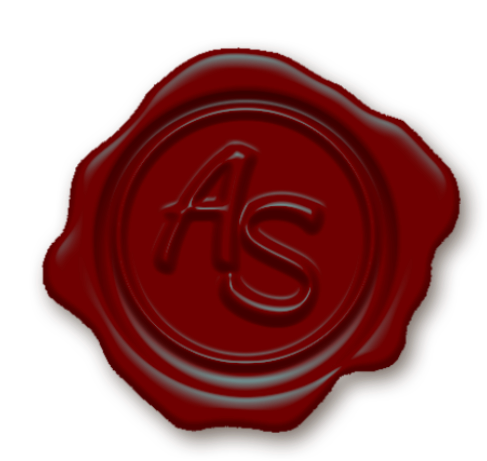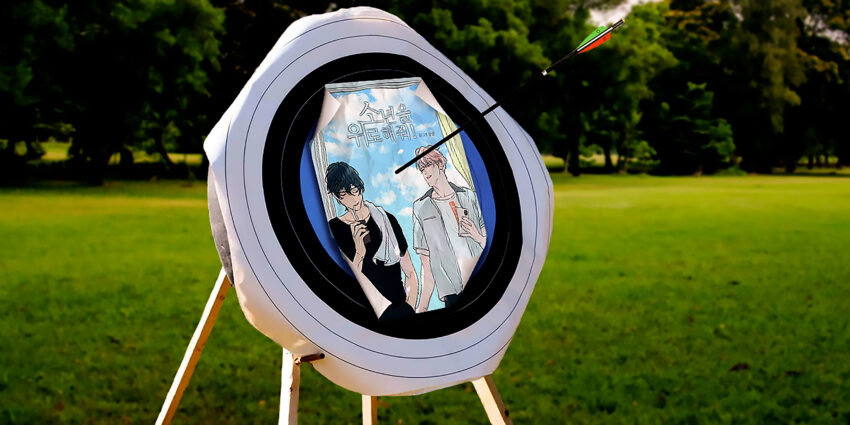What is the reason why we do what we so? Can a trauma suffered in the childhood affect us once adults? These questions represent two of the main topics of A shoulder to cry on.
A shoulder to cry on is a korean webtoon written and illustrated by the artist named Dongmul. It’s a Shonen ai story of 30 chapter released in 2020.
In 2023 the manga has been adapted in a live action tv series available on Viki directed by Song Soo-lim with Kim Jae-han and Shin Ye-chan in the role of the two protagonists, respectively Lee Daeyol and Cho Taehyun.
THE PLOT
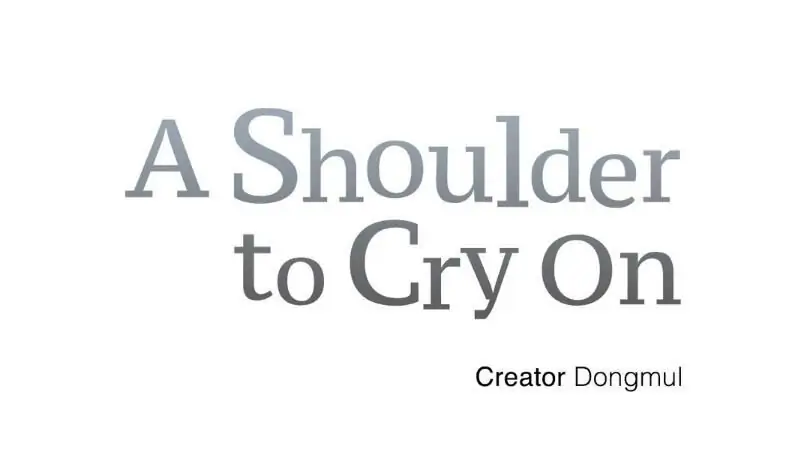
Dayeol hears two guys fooling around in the nurse’s office and accidentally knocks over the curtain rod. When the nurse walks in on the scene, devilishly handsome Taehyun tells her that Dayeol tried to make out with him. Before Dayeol can correct the misunderstanding, the rumor spreads and his archery scholarship is in jeopardy. To make matters worse, Taehyun doesn’t show the slightest bit of remorse; in fact, he shamelessly begins hanging around Dayeol. It’s not long before the two begin walking the thin line between hate and love.
MOTIVATION AND TRAUMA
As mentioned in the introduction of the article, two of the main topics of A shoulder to cry on are motivation and trauma. These are hard and topics because they are about complicated dynamics such as emotions, feelings and inner life that are hard to explain and even harder to understand.
They are topics to which subjects like psychology, sociology and philosophy have dedicated and still dedicate a lot of studies.
These two topics are represented by the two protagonists Lee Daeyol and Cho Taehyun, whose personal stories intertwine and grow in a unexpected way for both the characters and the readers. This is one of the particular aspects of this webtoon, the story is not what the audience expects from a simple Shonen ai manga, that is a love story basically. No. it’s more than that, the story told in A shoulder to cry on is deeper and its characters are more complicated that it may seem. They lead to think and give strong messages to those who read and are able to go over what they read.
So, the purpose of this article is to analyze these two main topics and discuss about some of the thoughts that this webtoon lead us to think about the everyday life.
WHY DO WE DO WHAT WE DO?
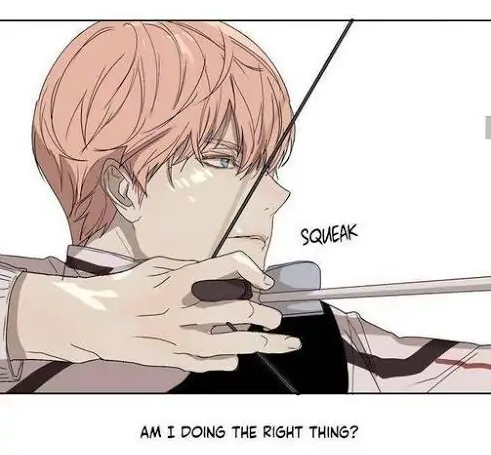
Why am I doing it? I’m doing it for the right reason? Maybe not, then I have to keep doing it? Daeyol never doubted about what he was doing until the day of the incident in the infirmary. Until that moment, he has always lived his life smoothly between studying and training in archery.
Taehyng frames him of harassment and all his world made of a routine, he has never realized to have, get turned upside down. Daeyol has to face the terrifying possibility to lose everything he has, that is his archery scholarship that allows him to study in that school. But above all, he is forced to question and think about his life like he has never done before.
What if I lose archery? What if I lose the only thing I have always done and I think to be able to do? But above all, Why I actually practice archery? For what reason? That reason is right?
How many times we have asked ourself why we are doing something? What are we doing this for? We’re doing it because is necessary? Because we like it? For money? Or because it’s useful for someone? We try to answer to these questions considering different options but which is right? What does really make us keep doing that activity? Or doing that job? What is our motivation based on?
This is what many researchers, of psychology and more, above all regarding the topic of work, have always tried and still try to understand.
About one thing they are sure, when we have to do something, whatever it is, it’s important having the right motivation, for concluding it and getting benefits, physically and psychologically.
THE SOCIAL STATUS AND THE ENVIRONMENT
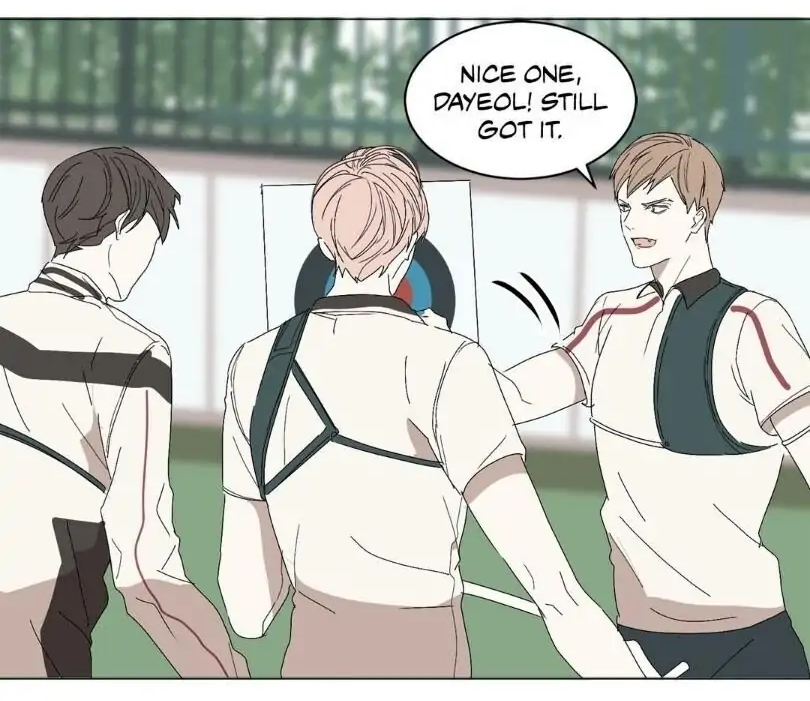
The psychologist Alfred Adler, student of the famous psychanalyst Sigmund Freud, claimed that the motivation is based on a sense of inferiority that leads to perfection.
His theory is innovative respect to that of his mentor because it expands the concept of motivation. It derives not only from the past of the individual and his/her unconscious but also from his/her social status and the environment where he/she lives. So, the motivation is not based only on internal factors of the individual but also external.
Considering Daeyol, his social status is that of a student with a scholarship. Its sure that his social position influences his motivation to practice archery, without the scholarship he would be forced to leave the school before graduation. Beyond this, there is also the weight of the expectations of his parents, his teammates and trainer because he is really good in that sport.
FEARS AND NEEDS
Daeyol is a skilled archer, he has always trained really hard to hit the target, to get the higher results. However, despite his commitment, he has never gotten what he wanted. Why? To answer that question, he has had to think about the reason he was practicing archery for.
As he said himself in chapter 16:
“I’ve just been ignoring it until now. I was suffocating myself. I was never happy with my accomplishments. ‘I made it’ that’s all it was ever about. And at some point, I started feeling as if the target was staring at me. Trying to kill me. I was never relieved when I did well. I was scared when I didn’t. I felt like I was going to die… scared of falling behind. It was like my whole life depended on the target. There was nothing else. Because I had gotten rid of it all. What I learned after almost 10 years of practice was that…10 was safe. And that the rest could kill me”
First of all, form his words it’s clear his fear to fail. The American psychologist David McClelland considered the fear to fail the mirror of a need of success (or achievement). According to him, the motivation (in a managerial context) is based on three needs: achievement, affiliation and power.
Daeyol has never practicing archery and he has never wanted to get the higher results because he needed to feel part of the team or he needed control and power. He practiced that sport because he was afraid to fail.
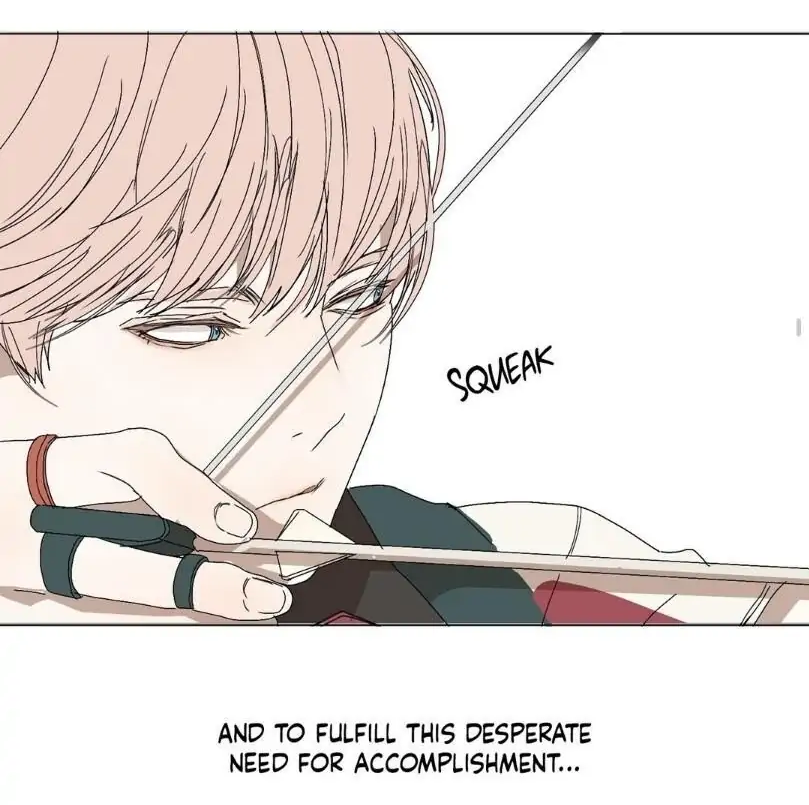
For him, hitting the target and getting the maximum score has become a question about life and death, a way to survive. Surviving fall in that instinct of life that Freud claimed as one of forces that influences the individual’s behavior.
As the archer claims, getting 10 made him feel safe while getting other scores made him feel in danger. It’s clear from his words that he needs of physical and emotional safety. The need of safety is one of the needs that Abraham Maslow put at the base of the process of motivation of individuals.
SAFETY IS JUST A STEP OF A PROCESS
Maslow is the creator of the one of the most famous and used motivational model, the Need Hierarchy Theory according to which the motivation is a process based on the satisfaction of 5 levels of needs: physiological, safety, belonging or social connection, esteem and self-realization.
He claimed that self-realization is ultimate goal of an individual who has also a specific purpose in life. Only identifying and following that purpose the individual can reach a complete fulfillment. In other words, he claimed that everyone has some potential and has to do what allows him/her to realize it. Otherwise, despite all the other needs are satisfied, we are unsatisfied and restless.
So, according to him, Daeyol with archery wasn’t expressing his full potential. He was satisfying a need that is at the base of the process of his self-realization. For this reason, he is restless and unsatisfied about his results.
PASSION AND IDEAL WORLD
The character of Lee Daeyol in A shoulder to cry on makes us think about how important is having the right motivation when doing something, that can be a job, a sport or whatever other activity. We can’t do something only to satisfy a physiological need (although it is important) like eating or drinking, or because our social status forced us. Above all, we can’t do something only because we are afraid to fail or because we think that it is the only thing, we are able to do. Like Maslow said, we would be restless and unsatisfied, we need something else. Daeyol realized that after being beat in a competition by a guy who stopped training for three years and after talking with his trainer.
His archery trainer tells him that she sees his commitment but not is passion.
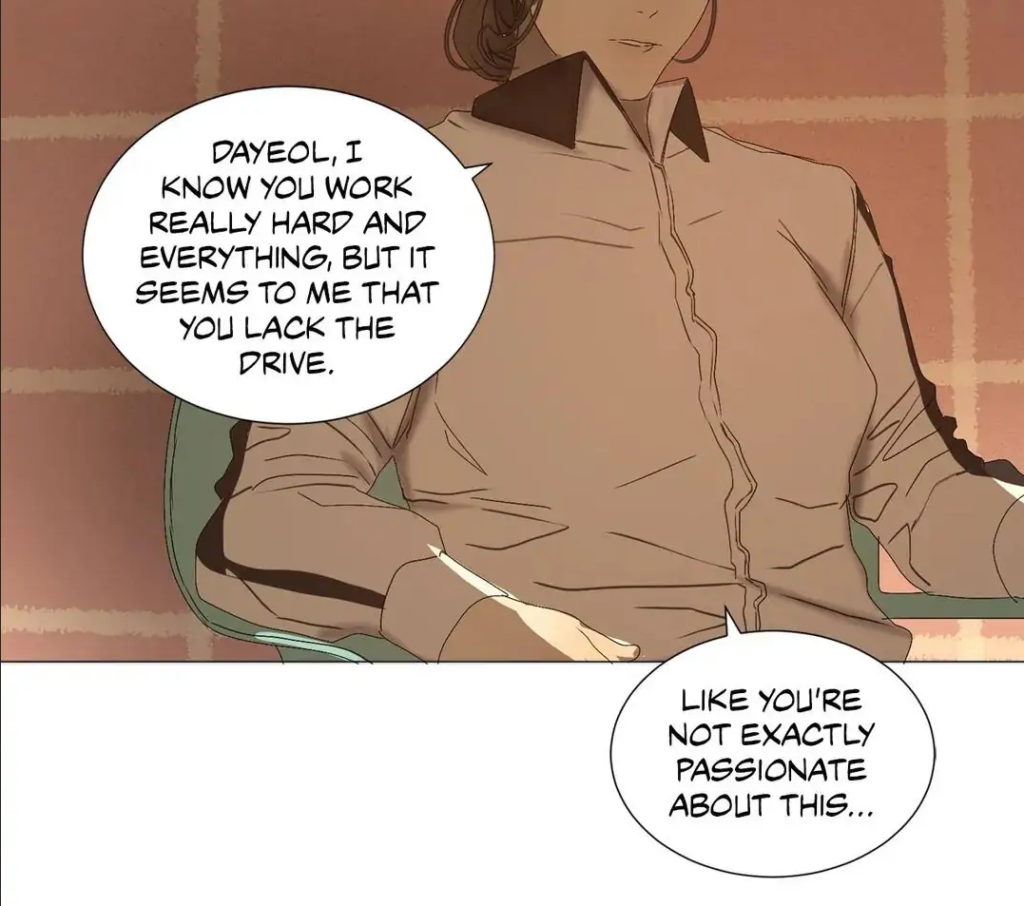
Passion is what ca be defined as a real interest for what we do, a positive physical and emotional engagement. In simpler words, we have to appreciate what we do, even a bit. Otherwise, doing it does not make sense, we can get anything by it, no results or benefits.
LIFE IS A FIGHT TO SURVIVE AND HAPPINESS IS A LUXURY
The world and the society where we live goes fast, the life goes on in a tight rhythm, there is never enough time. For this reason, like happened to Daeyol, we can realize what we are doing until something shake the routine where we are unconsciously trapped and forced us to think, to question about our life, what we are doing, where we are going and if we are really happy.
Freud claimed that the reason of the human misery is that the individual exchange part of his possibility to be happy for the, even if minimal, safety given by the social order. In other words, the society forced him to choose between his happiness and his stability, that rarely means to be happy and safe.
From this point of view, Daeyol’s father words are meaningful. When his son tell him he wants to quit the club of archery in he says:
“Do you expect to get through life by just doing whatever you want? […] Daeyol, listen to your father. I don’t like… what I’m doing now. There’s absolutely nothing… fun about it. But do you know why I keep going? Because I’m scared. That’s why. I’m just doing it to survive. To get by. Do you understand what I’m saying? It’ll just be the same, whatever path you choose. What, you think it’ll be any different?”
Like Darwin claimed, life is a fight between life and death and only the strongest survive. We need to accept compromises to go on, it is sad to say but happiness is a luxury. This is the meaning of Daeyol’s father words.
WE ARE WHAT WE’VE LIVED IN OUR CHILDHOOD
One of the questions made at the beginning of the article was: Can a trauma suffered in the childhood affect us once adults? Generally speaking: Can an event with a particular negative deep impact happened during childhood influence an individual unconsciously in the adulthood?
Psychology says yes and, in A shoulder, to cry on Taehyun with his personal story shows that. Trauma is the other main topic of this webtoon but what is a trauma? In Psychology, a trauma can be defined as an alteration of the psychic state of the individual due to his inability to react to overwhelming events. In 1925, Freud defined trauma as “any excitations from the outside which are powerful enough to break through the protective shield there is no longer any possibility of preventing the mental apparatus from being flooded with large amounts of stimulus which have broken in and binding of them”.
What causes a trauma? Researches have demonstrated that it can be caused both by a single event or experience with a strong negative impact or multiple events repeated for a long time.
THE PAST CAN INFLUENCE THE FUTURE
A trauma or a traumatic event can happen at any age but those that happens during childhood or the so-called developmental age are particularly interesting for studies. For developmental age we can define that period in a life of an individual characterized by an evolution of sensorial, cognitive and social processes and functions. In other words, it’s that period of life where an individual learns how to socialize, think and react to internal and external inputs. It a delicate phase of the life where an individual is more sensitive to what surround him/her and he/she is more impressionable.
A particularly overwhelming event can modify this process of development and evolution and have consequences in the future life of an individual.
Taehyun is an example of that, he suffered a painful trauma when he was only 6 years old and it has influenced him for all his life unconsciously. Meeting Daeyol and getting to know him has awakened his old memories about his traumatic past and the emotions related to it. So much to make him hurt himself in order to try to suffocate them.
DEFENSE MECHANISMS
Taehyun was adopted when he was 6 years old by a young couple who, it’s not directly explained but we can guess it, could not have children. His adoptive mother got pregnant eventually and the young boy feared to be abandoned when the baby would be born.
One day, the young Taehyung revealed to his aunt his feelings and said that he hoped the baby would never be born. Sure, he didn’t say a good thing but he didn’t mean to be evil, he was just scared to be abandoned. His aunt scolded him and slapped him, so Taehyun ran away. His mother went searching for him and fell victim in a car accident, that made her lose the baby.
From that moment on, Taehyun’s world got turned upside down, his adoptive mother told him she hated him and after a couple of years took her own life. His aunt and grandma blamed the boy for her death and for the rest of his life they didn’t miss a chance to remind him he was a murderer.
Due that experience, Taehyun implements unconsciously some defense mechanisms and a particular behavior.
THE EGO TRIES TO PROTECT HIMSELF
According to Freud a trauma is an alteration of what he called Ego that is not able to react to the traumatic event, so it implements some defense mechanisms. Some of these defense mechanisms can be the repression, emotional closure, neurosis, self-harm and phobias. There many other protection forms that can be adopted by an individual after a trauma, some are more common than others.
For what concerns Taehyun, the trauma has made him protect himself firstly repressing the memories and above all the feelings linked to the experience. In particular, when he was 9 years old got hit by a flowerpot in the head and from that moment on, he convinced himself to not be able to feel anything bad or uncomfortable. As he says in chapter 16:
“When I was 9, I got hit in the head by a pot… and he messed up my brain. From then on, no matter how badly I treated others…even after killing them… I was fine”.
Basically, it’s like if he used that incident as an excuse to switch off his emotions and hide his memories. That is until he met Daeyol who, in some way with his manners, made him remember and feel again. The return of his memories and feelings, together with the encounter with his aunt who defines him once again a murderer, overwhelms him so much to make him harm himself in order to suffocate them again.
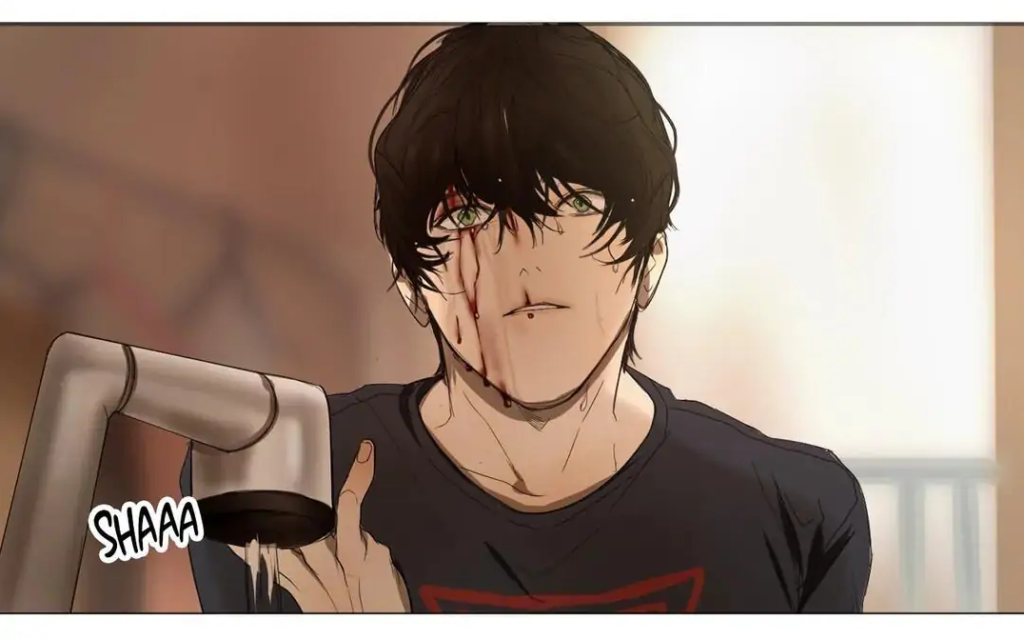
Self-harm is another defense mechanism with which the individual tries to turn his psychological pain into a physical one in order to make it more manageable and tolerable.
DON’T JUDGE A BOOK BY ITS COVER
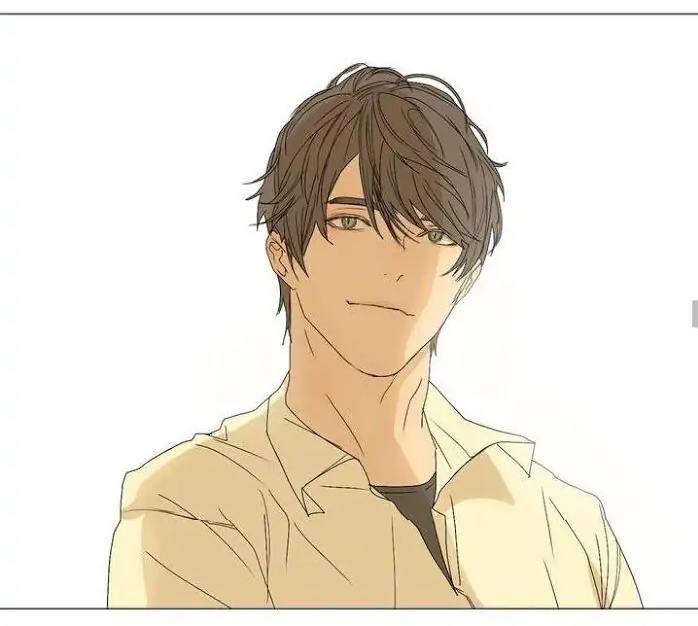
At the beginning of the webtoon, Taehyun is presented as a young boy with an ambiguous behavior. He doesn’t seem to feel guilty for what he has done to Daeyol he doesn’t even seem sincere when he says to be sorry for that. The boy appears cold and aloof; despite he is aware of what he has done he doesn’t seem to care about it. He bothers Daeyol like if he enjoys making him uncomfortable.
Basically, he acts like a psychopath but this is only a mask and Daeyol understands that in chapter 17 when. After taking Taehyun to the hospital to check on his head injury, he reveals him what made him to do that gesture.
This is meaningful, this moment shows first of all how nothing is as it seems. We can’t judge a person from how he/she appears like we can’t a book by its cover. We can say how is a book without reading it and in the same way we can say anything about a person without knowing him/her. Too many times people make this mistake but in a society like ours, where appearing has become progressively more important than being, its easy to be wrong.
Secondly, it shows how important the words are. They have the power to reveal.
Taehyun tells Daeyol about his past and he did it in way that surprise the archer:
“He told me what had happened, calmly and quietly. I wasn’t prepared for it. Just like that, I was suddenly taking in everything about Cho Taehyun. It was a story from a long time ago… I couldn’t even remember what I was doing when I was that age. He had a blank look in his face… but his story was detailed and raw. Like a fresh wound”.
Then they have also the power to change things. After listening to Taehyuns’story, Daeyol now understands his classmate’s weird behavior. He was suffering and the pain was making him act in that way, he judged him wrongly. He tells him this, but he also tells him something that affects him deeply.
WORDS ARE IMPORTANT
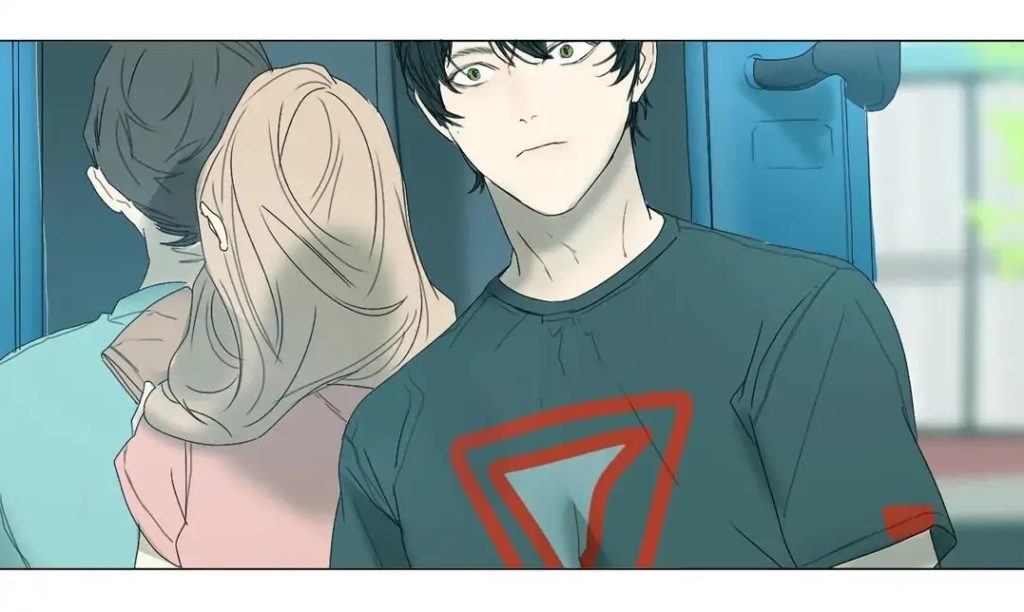
“That doesn’t mean you killed her. It was just an accident” is what the archer tells his classmate and have a huge impact on him. This what Taehyun would have always wanted to hear, they involve forgiveness that is what he has always searched for. Those words make him also realize something.
Daeyol’s words not only give Taehyun the strength to forgive himself but also, they make him realize that he has been suffering for the whole time. He thought to have put his past behind him but it wasn’t true, he wasn’t aware of the fact that his pas was affecting him.
This shows how important is listening and above all comprehending, also how the right words can change everything. Words are important, they can relieve the pain better that any medicine but they can also be more painful that any weapon.
Albus Dumbledore in Harry Potter and the Deathly Hallows says:
“Words are, in my not-so-humble opinion, our most inexhaustible source of magic. Capable of both inflicting injury, and remedying it.”
Coming back to the topics of the trauma, a trauma can be physical but also psychic, it can affect the mind status of an individual and leaving him invisible scars something more painful than those on the skin.
Being called repeatedly “murderer” has been for Taehyun as being stabbed every time, so he has tried to protect himself as he could, running way from himself without even realizing it.
The character of Taehyun in A shoulder to cry on, like his co-protagonist, makes us think about that we can be deeply influenced by what we live without even realizing it. That few words are enought to change everything and make us realize how we really are. That we don’t have to judge someone by how he or she appears because we don’t know what he/she has passed through.
CONCLUSIONS AND PERSONAL THOUGHTS
A shoulder to cry on was the first webtoon I have ever read and I don’t know if what I talked about in the previously paragraphs is really there or it’s just me. Maybe I saw in this story more than what it is but this is what I found myself think about while reading. I wanted to write it down in this article that should be a review.
So, for what concerns the style, it can be defined as clear and sharp. I appreciated the way the artist drew the eyes and the facial expression of the characters.
About the story, it should be clear at this point that the love story is just a common thread. A wire that sews together two different and deep stories. These are the stories of two scared boys who are looking for themselves and literally “a shoulder to cry on” that is someone who understands them and take care of them.
The finale is not what you expect but is the right end for this story. The relationship between the two protagonists is as complicated as them, they have a lot to learn about themselves and their path.
Anyway, as said at the beginning of the article, there is a live-action adaptation of this webtoon available on Viki. I haven’t watched it yet. It will be interesting seeing how the story has been modified and how the actors have portrayed these two complicated characters. Will I find the same things I found in the comic? I will find out when I watch the drama which includes 8 episodes, I will write about it again.
DO YOU LOOK BEHIND WHAT YOU SEE?
I would like to know if I am the only one who “look behind what she sees”, as Rafiki says in The Lion King. Someone else saw all of these things in A shoulder to cry on? Someone saw something else? I would like to know, maybe in the comments.
